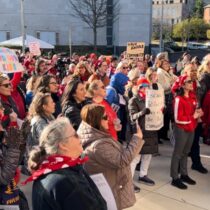Last week, a county council committee moved to reduce some requested funding for Montgomery County Public Schools’ (MCPS) operating budget.
On Monday, Council President Evan Glass said the full council will discuss the recommendation on Friday.
The Education and Culture Committee recommended reducing MCPS’ fund balance by $22.3 million during a meeting last week. Councilmember Will Jawando, committee chair, said it “lines up to about 1% in the property tax increase.”
As part of County Executive Marc Elrich’s operating budget announcement in March, Elrich proposed a 10-cent property tax increase to fund schools.
The committee also moved to put the remaining requested $201 million, “which is equivalent to roughly 9% on the property tax increase,” according to Jawando, on a reconciliation list in high-priority and priority categories.
“I know the school system could use all of this funding and needs it to support teacher salaries, educator salaries and the accelerators and programs, I believe that, personally,” Jawando said. “But I also know that we have difficult decisions to make in the budget that we’re going to consider at the full council.”
“Students continue to come to this school system with different needs and they are continuing to come and we must serve them,” MCPS Superintendent Dr. Monifa McKnight said before the committee.
“We have to pay [staff] and give them the respect that they deserve to be those educators who are doing the hard work of serving our students,” she said. “We cannot choose, I can’t see how we can.”
In a written statement, McKnight and School Board President Karla Silvestre said the move from the committee “places the district in a seriously difficult position” with trying to address priorities coming off of the pandemic.
“The most significant concern is essentially the jeopardy in which this places the key investments that were specifically designed to fully staff our schools and address disparities in literacy and math, close opportunity gaps, and create greater equity across the district, especially among our black and brown students, and students receiving special education, language, and meals services,” the statement reads.


Comments are closed.